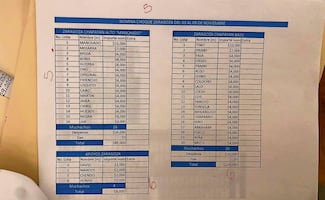Más Información

Hallan cuerpos de dos mujeres en caminos de terracería en Silao e Irapuato; difunden fichas de búsqueda de otras 12 jóvenes

Harfuch: se investiga narconómina de "El Mencho" dada a conocer por EL UNIVERSAL; no hay funcionarios ligados a indagatorias, indica

PVEM se deslinda de Pedro Segura Valladares tras amenazas a Loret; "no es ni ha sido militante del Partido Verde", asegura

Buscan a menor de edad y a su madre, originarios de Reyes Llano Grande, Oaxaca; desaparecieron desde el pasado 24 de febrero
The Trump administration committed a mistake of profound strategic dimension in the Middle East with the assassination of Iranian Major General Qassem Soleimani , and in order to understand its potential long-term repercussions, it is necessary to know the nature of his struggle in the last two decades against the United States , Israel , Saudi Arabia , and their Jihadist allies .
Contrary to the allegations made by the White House and the Department of State to justify the murder of Soleimani in Baghdad last Friday, saying that he was planning “ imminent attacks ” on U.S. facilities and personnel across the Middle East , Iraqi Prime Minister Adel Abdul-Mahdi has revealed that according to his dual role as a military leader and diplomat, Soleimani traveled to Baghdad to discuss a rapprochement that Iraq was brokering between Iran and Saudi Arabia .
Before his country’s parliament, Abdul-Mahdi detailed that he was expecting to meet the head of the Quds (“ Jerusalem ”) Force , the external arm of the Iranian Islamic Revolutionary Guard Corps ( IRGC ), on the morning he was killed by two drones along with Abu Mahdi Al-Muhandis , vice commander of Iraqi militia Popular Mobilisation Committee .
United States President Donald Trump
, the Iraqi Premier declared, even personally thanked him for the efforts; Soleimani , who in spite of the black legend created around his figure by Western propaganda often traveled without security measures and used his phone freely, had shown his diplomatic skills many times in the past.
For instance, Soleimani encouraged among the Shiite political parties the selection of a new Iraqi Prime Minister in 2018 — Abdul-Mahdi —and of a new President — Barham Saleh —that would not be boycotted by Washington , understanding the importance of maintaining a good bilateral relationship for the stability of ancient Mesopotamia .
According to the journalist Elijah J. Magnier , as representative of Iranian Supreme Leader Ali Khamenei , Soleimani accepted the appointment of Haider al-Abadi as Iraq’s Prime Minister in 2014 , although he had proposed the reelection of Nuri al-Malik i, due to the opposition from the Marjaiya , the influential council of Shiite ayatollahs based in Najaf .
His main work, however, was the consolidation of the “ Axis of Resistance ” spanning from Gaza to Yemen ; in particular, he convinced Russia to intervene in Syria in 2015 , saving the government of President Bashar al-Assad threatened by rebels, because, he said, “we are not as the Americans. We don’t abandon our friends.”
“He was the man responsible for defeating the Islamic State in Iraq and Syria ,” notes the blog Moon of Alabama , and as such, Soleimani was recognized by U.S. media, which published photos of him studying the situation on the battleground with Iraqi military officers.
Positive involvement
“Top U.S. general Martin Dempsey [then Chairman of the Joint Chiefs of Staff ] has said that the involvement of Iran in the fight against ISIS in Iraq could be a positive step, as long as the situation does not descend into sectarianism,” highlighted Newsweek in 2015 while Soleimani was preparing the liberation of Tikrit , the site of mass executions of Iraqi forces by Islamic militants .
For his part, Jordan Perry , principal Middle East analyst at global risk analytics company Verisk Maplecroft , underscored that “without the financial and military backing of Iran , it would be extremely difficult for Iraq to launch a successful offensive on Tikrit , and, further up the Tigris , Mosul as well.”
Sajad Jiyad
, an Iraq expert at independent consultancy Integrity , added that Soleimani was playing “an integral role in coordinating the offensive against ISIS as he brings a vast wealth of experience and provides a key link to Tehran for material support. He is good at asymmetric, unconventional warfare, so parts where you have to operate in cities and dense urban areas.”
Soleimani
, remarked The New Yorker in a report in 2013 , also collaborated with the U.S. against the Taliban movement in Afghanistan —he battled opium smugglers along the common border,—and helped stabilize Iraq during the bloody years of ethnic strife that followed the American occupation in 2003 . His cooperation through direct and indirect channels was admitted by Ryan Crocker , U.S. Ambassador to Baghdad from 2007 to 2009 , as well as by his successor James Jeffrey ( 2010 - 2012 ).
Born 62 years ago in Rabor, a mountain village in eastern Iran , Soleimani joined the new IRGC in the city of Kerman after the victory of the revolution led by Ayatollah Ruhollah Khomeini which ended the corrupt and authoritarian regime of the pro-U.S. Shah Mohammad Reza Pahlevi in 1979 .
With only a high-school education and little military training, he quickly gained a reputation of bravery fighting the Kurd uprising in northwestern Iran , and especially the invading Iraqi troops headed by President Saddam Hussein with Western and Saudi support, including targeting information for chemical-weapons attacks.
A hardline nationalist considered a hero of the Sacred Defense , the name that Tehran gives to the Iran-Iraq War ( 1980 - 1988 ), in which he became a division commander while still in his twenties, Soleimani was called by Khamenei “ a living martyr of the revolution .”
After the conflict, he was named head of the Qods Force in 1998 with the mission of developing the asymmetric warfare doctrine in order to face powerful enemies like the U.S. and Israel , as well as expanding Tehran’s influence in Arab countries ruled by Sunnis .
With a base in the former U.S. embassy in Tehran, Soleimani , who described himself as “the smallest soldier,” built an organization of 20,000 men with branches focused on intelligence, finance, politics, sabotage, and special operations crucial for Iran’s intervention in Lebanon backing the Shiite militia Hezbollah against the Israeli invasion ( 2006 ), the defeat of the Islamic State in Syria , or the current war between the Yemeni Houthis and the occupying coalition led by Saudi Arabia .
His death is a true game-changer, which modifies the rules of engagement and has put Washington and Iran on the brink of war; after all, the popular Soleimani was seen by some observers as a possible presidential candidate in a time when Iran has suffered from U.S. economic sanctions and people protested across the country due to a sharp increase in fuel prices.
Nevertheless, Tehran’s moderate response to the provocation , launching a salvo of missiles on two U.S. bases in Iraq with no casualties reported is offering the White House an opportunity to de-escalate the crisis and avoid a major conflict capable of causing the loss of countless lives and disrupting the world’s economy.
A week of tension, unity, and pain in Tehran
Editing by Sofía Danis
More by Gabriel Moyssen
Noticias según tus intereses
[Publicidad]
[Publicidad]










